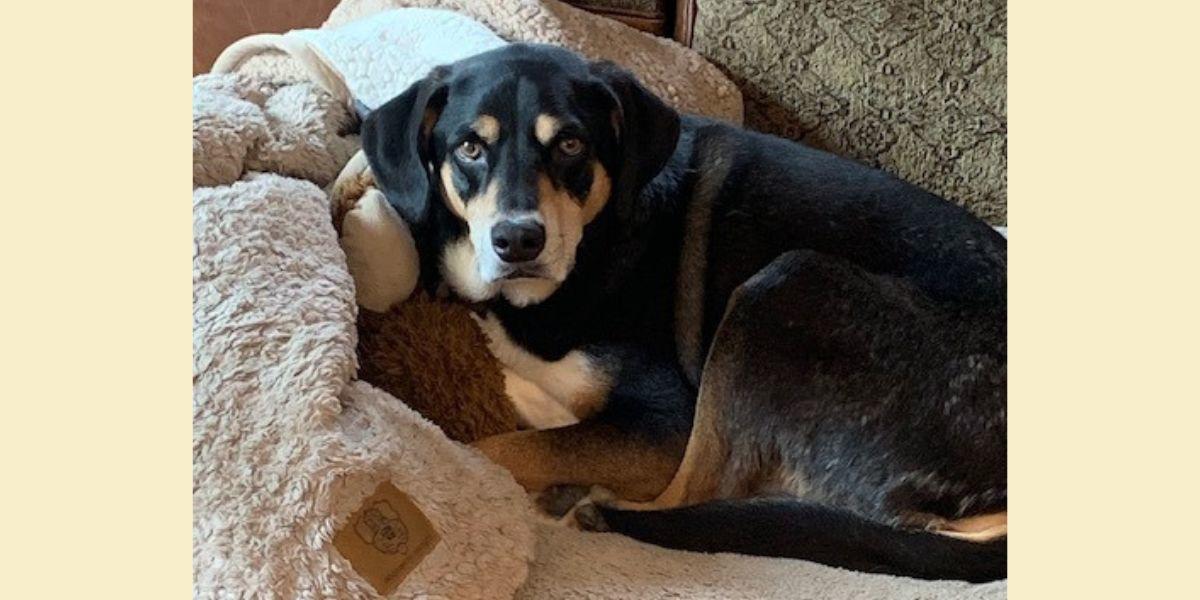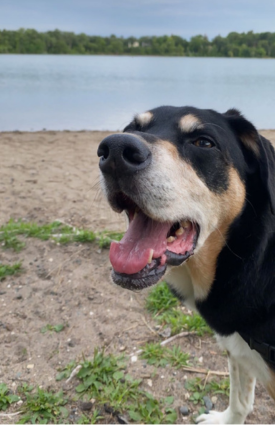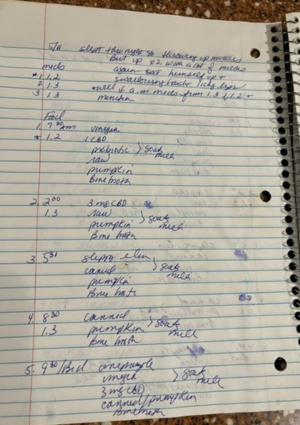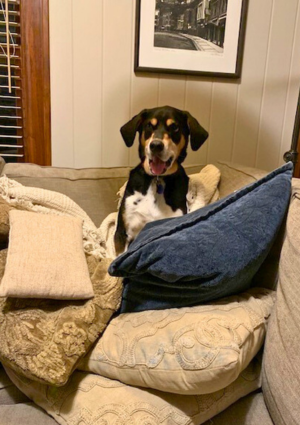Overcoming adversity
Markus the rescue dog beats the odds against autoimmune, neuromuscular disease

Markus the rescue dog beats the odds against autoimmune, neuromuscular disease
Markus takes time to relax and cuddle with blankets and pillows.
Before winning the hearts of Tom and Lori Barnd, Markus, a young mixed-breed dog, was nearing the end of his welcome at a shelter in Georgia.
A stray, Markus had been wandering for about three months before landing at the shelter. After not finding a placement for Markus during his welcome window, the shelter planned to euthanize the dog. At that same time, the Barnd family from Minneapolis was searching for a foster dog.
When he joined the Barnd’s home in May 2014, the family instantly fell in love and decided to become Markus’s forever home. Following a brief medical hold to sort out health issues that included a pelvis permanently wounded from a pellet gun, Markus was cleared for adoption by the Barnds. Markus quickly bonded with his new family and they soon could not imagine life without him.

In June 2020, they became concerned when Markus began to drool excessively. Over the course of a few weeks, Markus deteriorated and started to gag and regurgitate food while eating. He also struggled or, sometimes, simply refused to walk. The day Markus fell down the deck steps, the Barnds knew his struggles were not just something related to the old pelvis injury and it was time to get him to the clinic.
After reaching out to their local veterinarian, the Barnds were told the University of Minnesota Veterinary Medical Center (VMC) could provide the best care and diagnostic testing.
Over the course of a 12-hour visit, the family gratefully received frequent updates from Markus’s care team. Based on Markus’s difficulty walking and his regurgitation, Dr. Susan Arnold, a neurology specialist, and Dr. Kylie Roman, a small animal intern, suspected that Markus had myasthenia gravis (MG). This is a disorder in which the body produces antibodies that interfere with signaling between nerves and muscles.
Markus’s diagnosis of myasthenia gravis was confirmed with a blood test to measure the antibodies that are produced in the condition.
The MG diagnosis explained Markus’ drooling, teary eyes, and difficulty walking and eating. MG causes muscular weakness and fatigue and affects the body’s voluntary muscles—often impacting the eyes, mouth, throat, and limbs.
The connection between nerves controlling the muscles of the esophagus is also affected, causing megaesophagus (ME), which refers to the esophagus expanding and losing its ability to move food to the stomach. Instead of moving to the stomach, undigested food becomes lodged in the throat and causes regurgitation or, sometimes, enters the dog’s lungs and leads to pneumonia.
ME often shortens a dog’s lifespan because of the constant risk of pneumonia. If the dog’s owner is willing and able to manage the condition, a dog with ME can live a relatively normal life provided they do not contract severe pneumonia.

Arnold reassured the Barnds that special care could optimize Markus’s quality of life and well-being. By feeding Markus soft food with a spoon while he was seated upright and by keeping him in that position for 10 to 20 minutes following the meal, gravity could help to move his food down the esophagus and minimize regurgitation.
While Lori and her daughter celebrated Markus’s release from the hospital with a high five, they knew the road ahead would not be easy.
“The first week at home was a research project,” Lori explains.
His care team prescribed medication, the benefits of which only last a few hours. Lori recalls a notebook brimming with notes the family kept to track Markus’s medicine, eating, and symptoms. She shared their observations in a monthly summary to Arnold who used the information to manage Markus’s case.
The entire family took turns caring for him through the night by sleeping on the couch next to Markus on his bed to give him medication or manage regurgitation.
Markus’s path to healing was not a straight line. At a follow-up appointment in February 2021, Arnold found a suspicious mass in Markus’ chest. Based on its location, Arnold suspected a tumor type called a thymoma. Thymomas originate from the thymus, which is an organ that is part of the immune system. These tumors can produce the antibodies that are responsible for MG.
This finding made sense because although Markus’s overall condition was improving, a blood test showed that his antibody production was still high because the tumor was continuing to produce the antibodies. This would mean that in order to resolve Markus’s MG and ME, he would need to have the tumor surgically removed. Arnold consulted with Dr. Pierre Amsellem, a boarded veterinary surgeon with expertise in surgical oncology.

Because dogs with ME are at higher risk for aspiration under anesthesia, Amsellem spent a lot of time with the Barnds in advance of the surgery to ensure the team caring for the dog in follow-up was prepared to meet his special needs. Markus’s surgery went well and a mass the size of a tangerine was removed. No other masses were found and no chemotherapy or radiation was required. In the months that followed, Markus’s antibody levels progressively dropped, and his condition continued to improve.
Markus’s medical journey at the U of M has one more chapter. In February 2023, Tom Barnd noticed Markus crying out in pain and unable to get up during an outing in the backyard.
Another visit to the VMC resulted in another surgery—this time to put his hip into place after dislocation and torn ligaments. Markus’s hip dislocation was unrelated to his MG, but meant that he would need to go under general anesthesia again. In preparation for this surgery, Arnold checked his antibody level again and found that it had dropped to normal.
This meant that Markus was in remission. Markus’s hip surgery went smoothly, and after several weeks of rest, he made a complete recovery. Markus also was weaned off his MG medication, and a recheck of his antibody level after months without needing the medication confirmed that he was still in remission.
To everyone’s delight, Markus was one of the lucky dogs whose results showed a good response from the medications, and who benefited from the removal of the thymoma which resolves MG in some instances. He was officially declared to be in remission from the disease. He is now able to drink water and eat food from a bowl.
“They didn’t give up,” Lori says of the VMC. “When other vets or clinics cannot figure out what is going on with your animal, they have the skills and resources to get to the bottom of whatever is happening.”
Markus’s story demonstrates the benefit of obtaining care at a teaching hospital such as the VMC. The hospital staff and veterinarians are often highly specialized and prepared to see a wide variety of cases and they have access to state-of-the-art testing equipment and are informed about the latest advances in treatment.
The Barnds couldn’t be happier with how Markus is doing, thrilled that they’ve been able to give him the best life possible despite all of the cards stacked against him. Now 11 years old, Markus enjoys walks and loves spending time with his family. It’s time they’re grateful to have with him.
“The U of M clinic, hands down, is the best—you will find no better care anywhere,” Lori says. “Everyone, from the workers at the front who check you in and out of your appointment to the doctors and students, is amazing.”